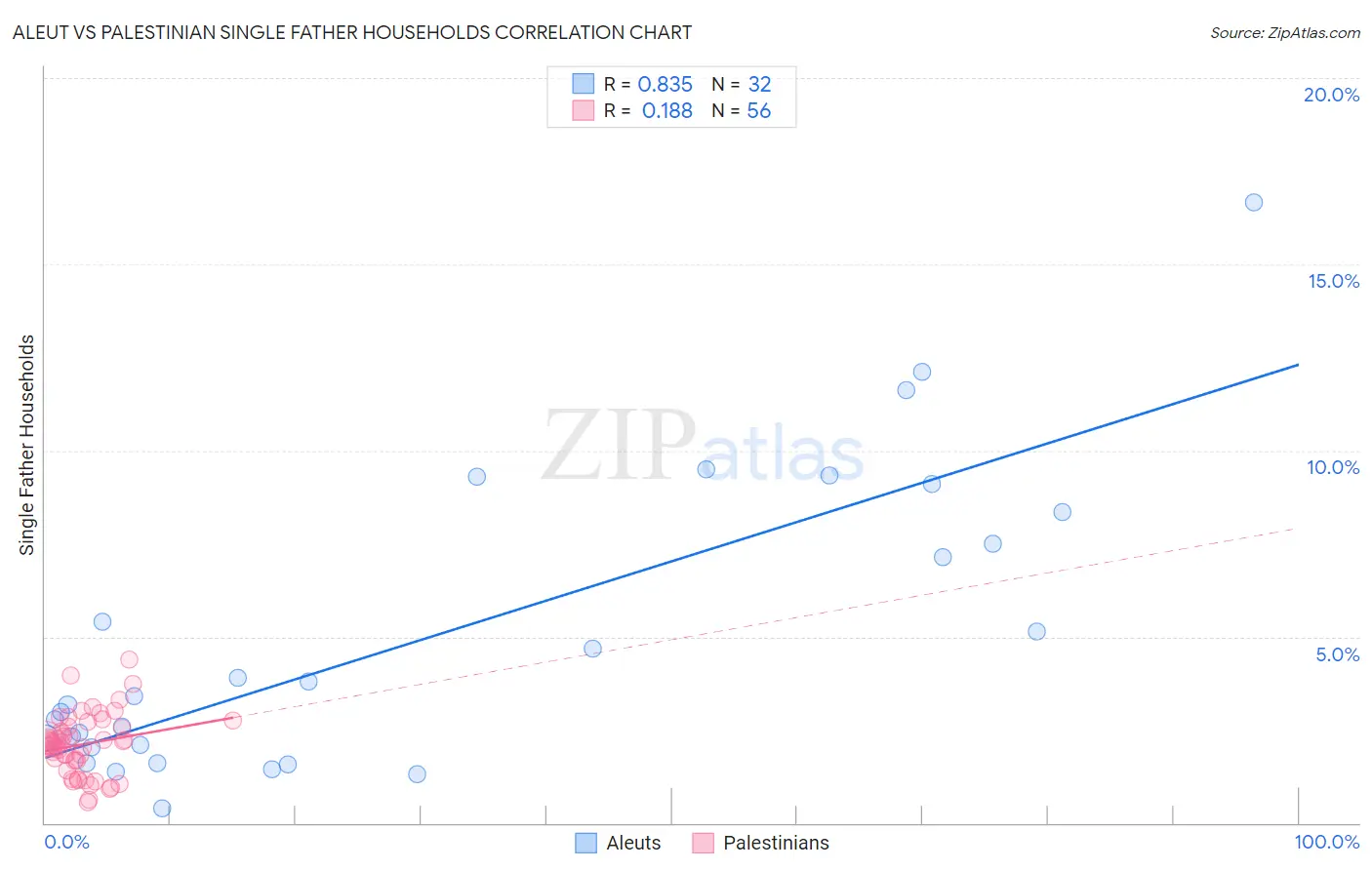Aleut vs Palestinian Single Father Households
COMPARE
Aleut
Palestinian
Single Father Households
Single Father Households Comparison
Aleuts
Palestinians
3.0%
SINGLE FATHER HOUSEHOLDS
0.0/ 100
METRIC RATING
326th/ 347
METRIC RANK
2.2%
SINGLE FATHER HOUSEHOLDS
98.6/ 100
METRIC RATING
105th/ 347
METRIC RANK
Aleut vs Palestinian Single Father Households Correlation Chart
The statistical analysis conducted on geographies consisting of 61,629,063 people shows a very strong positive correlation between the proportion of Aleuts and percentage of single father households in the United States with a correlation coefficient (R) of 0.835 and weighted average of 3.0%. Similarly, the statistical analysis conducted on geographies consisting of 215,869,880 people shows a poor positive correlation between the proportion of Palestinians and percentage of single father households in the United States with a correlation coefficient (R) of 0.188 and weighted average of 2.2%, a difference of 41.4%.

Single Father Households Correlation Summary
| Measurement | Aleut | Palestinian |
| Minimum | 0.40% | 0.57% |
| Maximum | 16.7% | 4.4% |
| Range | 16.3% | 3.8% |
| Mean | 5.0% | 2.1% |
| Median | 3.3% | 2.2% |
| Interquartile 25% (IQ1) | 2.1% | 1.7% |
| Interquartile 75% (IQ3) | 7.9% | 2.6% |
| Interquartile Range (IQR) | 5.8% | 0.88% |
| Standard Deviation (Sample) | 4.0% | 0.81% |
| Standard Deviation (Population) | 3.9% | 0.80% |
Similar Demographics by Single Father Households
Demographics Similar to Aleuts by Single Father Households
In terms of single father households, the demographic groups most similar to Aleuts are Immigrants from Mexico (3.0%, a difference of 0.19%), Bangladeshi (3.1%, a difference of 0.88%), Fijian (3.0%, a difference of 1.4%), Immigrants from Cabo Verde (3.1%, a difference of 1.4%), and Immigrants from Central America (3.0%, a difference of 1.5%).
| Demographics | Rating | Rank | Single Father Households |
| Ute | 0.0 /100 | #319 | Tragic 3.0% |
| Guatemalans | 0.0 /100 | #320 | Tragic 3.0% |
| Mexicans | 0.0 /100 | #321 | Tragic 3.0% |
| Immigrants | Guatemala | 0.0 /100 | #322 | Tragic 3.0% |
| Immigrants | Central America | 0.0 /100 | #323 | Tragic 3.0% |
| Fijians | 0.0 /100 | #324 | Tragic 3.0% |
| Immigrants | Mexico | 0.0 /100 | #325 | Tragic 3.0% |
| Aleuts | 0.0 /100 | #326 | Tragic 3.0% |
| Bangladeshis | 0.0 /100 | #327 | Tragic 3.1% |
| Immigrants | Cabo Verde | 0.0 /100 | #328 | Tragic 3.1% |
| Chippewa | 0.0 /100 | #329 | Tragic 3.1% |
| Nepalese | 0.0 /100 | #330 | Tragic 3.1% |
| Navajo | 0.0 /100 | #331 | Tragic 3.2% |
| Yaqui | 0.0 /100 | #332 | Tragic 3.2% |
| Natives/Alaskans | 0.0 /100 | #333 | Tragic 3.2% |
Demographics Similar to Palestinians by Single Father Households
In terms of single father households, the demographic groups most similar to Palestinians are Immigrants from Southern Europe (2.2%, a difference of 0.11%), Slovene (2.2%, a difference of 0.23%), Immigrants from Netherlands (2.2%, a difference of 0.25%), Barbadian (2.2%, a difference of 0.29%), and Alsatian (2.1%, a difference of 0.37%).
| Demographics | Rating | Rank | Single Father Households |
| Guyanese | 99.1 /100 | #98 | Exceptional 2.1% |
| South Africans | 99.1 /100 | #99 | Exceptional 2.1% |
| Immigrants | Northern Africa | 99.0 /100 | #100 | Exceptional 2.1% |
| Immigrants | Western Europe | 98.9 /100 | #101 | Exceptional 2.1% |
| Argentineans | 98.9 /100 | #102 | Exceptional 2.1% |
| Lebanese | 98.9 /100 | #103 | Exceptional 2.1% |
| Alsatians | 98.9 /100 | #104 | Exceptional 2.1% |
| Palestinians | 98.6 /100 | #105 | Exceptional 2.2% |
| Immigrants | Southern Europe | 98.6 /100 | #106 | Exceptional 2.2% |
| Slovenes | 98.5 /100 | #107 | Exceptional 2.2% |
| Immigrants | Netherlands | 98.5 /100 | #108 | Exceptional 2.2% |
| Barbadians | 98.4 /100 | #109 | Exceptional 2.2% |
| Italians | 98.3 /100 | #110 | Exceptional 2.2% |
| Immigrants | Canada | 98.3 /100 | #111 | Exceptional 2.2% |
| Immigrants | Trinidad and Tobago | 98.2 /100 | #112 | Exceptional 2.2% |